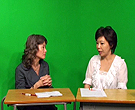Assessment, Teaching and Learning: from Principles to Practice
Selecting Appropriate Assessment Tasks
The process of selecting appropriate assessment tasks should be undertaken collaboratively, taking into account students' backgrounds, interest and skills as well as the school's available resources.
 |
|
One of the exciting aspects of school-based assessment is the opportunities it gives to teachers to develop their own assessment tasks to suit their own teaching goals and their students' needs. It is likely that the same task would not work equally well with students of different abilities. SBA lets teachers modify tasks and design new ones that will work for them and their class – whether they prefer something more traditional or are keen to experiment with new ideas and techniques.
 |
|
Grouping arrangements are a particularly important consideration. Initially it may be easiest for students and teachers to put students into friendship groupings.
 |
|
However, teachers should also experiment. Diversity can be a resource, not a problem. Having students with different levels of oral language skills in the same class can create an authentic information gap or need to communicate. Highly structured assessment tasks, including jigsaw activities which require the transfer of information, are better for such groupings than more open-ended tasks which require students to discuss or share ideas without a clear focus.
 |
|
Three of the most popular assessment tasks for Part A amongst Hong Kong teachers and students include:
Three of the most popular assessment tasks for Part B amongst Hong Kong teachers and students include:
